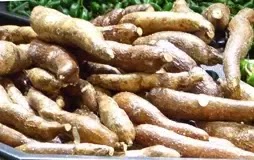Why you need a cassava diet today!
Cassava as we know it has earned a unique spot in the diet of Africans, particularly Nigeria. It's not only seen asManihot esculentusanihot esculentusthe commonest diet among the low income earners but also a perfect substitute for cereals and other staples as each tuber is a bag of calories.
Many avoid cassava meals particularly because of its cyanide content which if not extracted out to the barest minimum could lead to eye defect and other health abnormalities. For this reason and many more, cassava is regarded as a poor man's meal.
This cheap source of carbohydrates could be all you need to supplement your vitamin intake as it is discovered that manihot esculentum will do a lot than give you calories.
Dietary benefits of Cassava
1.Cassava has almost twice the calories than that of potatoes and maybe one of the highest value calorie food for any tropical starch rich tubers and
roots. 100 g root provides 160 calories. More tubers means more calories. The
calorie value mainly comes from sucrose which accounts for about 70% of total sugars. Amylose (16%) is another major complex carbohydrate sources.
2. Cassava is very low in fats and protein than in cereals and legumes. Nevertheless, it has more
protein than that of other tropical food sources like yam , potato , plantains , etc.
3. Like other tubers, cassava too is free
from gluten. Gluten-free starch is used in special food preparations for celiac disease patients.
4. Young leaves of cassava are a good
source of dietary proteins and vitamin K. Vitamin-K has a potential role in bone mass building by promoting osteotrophic activity in the bones. It also has established role in the treatment of
Alzheimer's disease patients by limiting neuronal damage in the brain.
5. Cassava is a moderate source of some of the valuable B-complex group of vitamins such as folates, thiamin, pyridoxine (vitamin B-6), riboflavin, and pantothenic acid.
6. It is one of the chief sources of some important minerals like zinc, magnesium, copper, iron, and manganese for many inhabitants in the tropical belts. In addition, it has adequate amounts of
potassium (271 mg per 100g or 6% of RDA). Potassium is an important component of cell and body fluids that help regulate heart rate and blood pressure.
Now you have reasons to eat food like fufu, akpu, Eba or even a vegetable soup made from cassava. Why don't you just go to that restaurant near you and order for a plate of whatever it is that contain cassava and have a first hand feel of these benefits.


Comments
Post a Comment